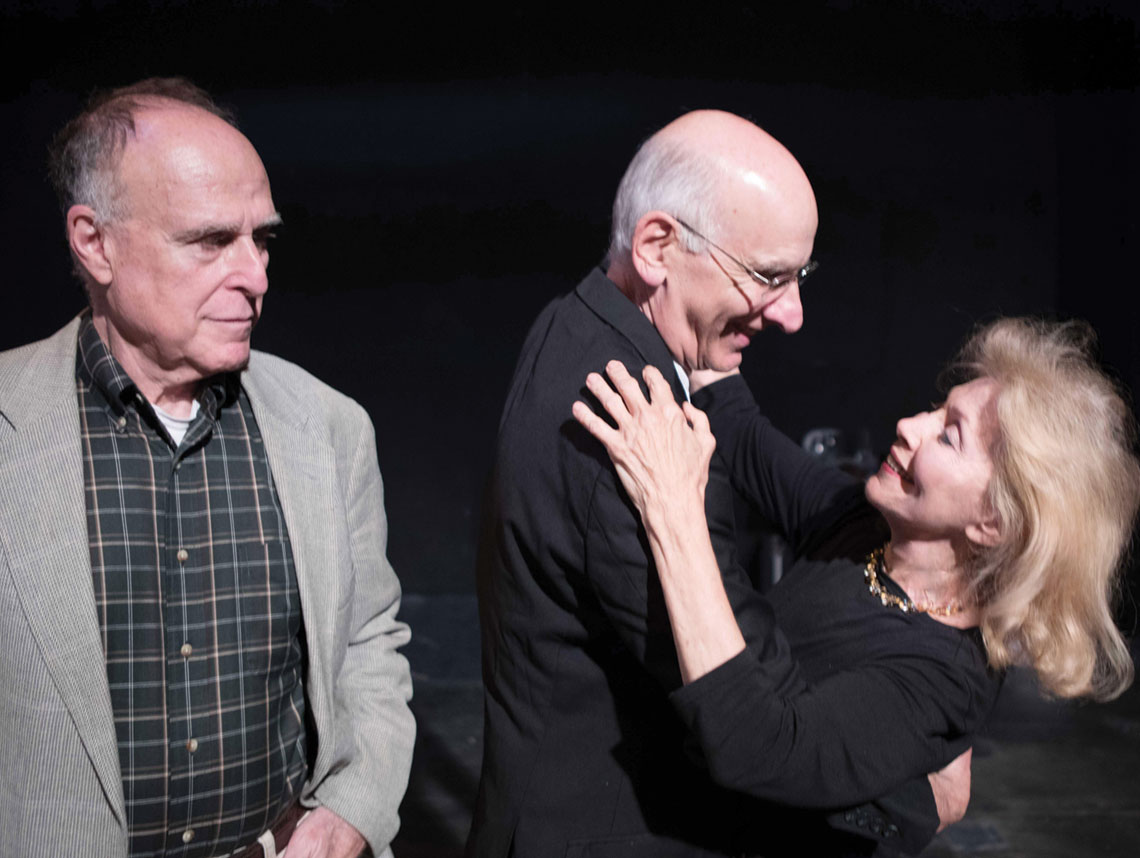 From left, cast members Richard Fancy, George Wyner and Sharron Shayne star in “Daytona.” Photo by John Perrin Flynn
From left, cast members Richard Fancy, George Wyner and Sharron Shayne star in “Daytona.” Photo by John Perrin Flynn Comedy, violence and sex collide in the play “Daytona” by British actor and playwright Oliver Cotton. The work, originally produced in England, is now being presented by Rogue Machine at The MET Theatre in Hollywood.
The comedy comes early as Joe (George Wyner) and Elli (Sharron Shayne), a couple in their 70s, bicker while practicing in their Brooklyn apartment for a senior dance competition. After Elli leaves to pick up her dress for the contest, Joe’s long-lost brother, Billy (Richard Fancy), turns up at their doorstep after a 30-year disappearance.
It seems Billy needs to hide out because he’s committed a violent act of revenge while on vacation in Daytona against an old man who apparently was living under a new identity but whom he recognized as being responsible for innumerable deaths when they were in a World War II concentration camp.
“The brothers were in the same camp, where they saw their father killed, and she [Elli] was in the women’s camp — Bromberg,” director Elina de Santos explained in a recent interview. “They knew each other before.”
The brothers and Elli survived, found each other, then went to America and made a life. For 10 years the three of them were together.
The director, who is not Jewish, speculated that being together during those years would bring up everything about their horrific past, a past she believes they’re running from in different ways. Joe tells Billy that people killed in the camps are dead and nothing will bring them back.
And what Billy does, de Santos explained, is force them to recall their days in the camp “because, in a way, you never really can get away from that. There’s no way. It was, and it is always, with you.”
Billy also reveals that, in the 30 years since he left them and the business he had with his brother, taking his share of the money with him, he removed the tattooed number from his arm; assumed the identity of a dead, non-Jewish man; got false papers; moved to Ohio; married a gentile woman; raised a family and regularly attended church — all while starting a successful real estate business.
De Santos said a variety of themes emerge from the piece.
There is the issue of identity. “I don’t think there’s any way to escape your identity, who you really are. That’s certainly what Billy learns — as much as he tried,” she said. “I think he ran away because he wanted to get away from that experience that they all had together.”
She added, “He thinks he’s just getting away from Elli and his brother, but I think he’s really getting away from being Jewish, of what it did to them; how, for him, it ruined his life. He wants to start a new life and, for him, starting a new life is not being who you were. He could pass. He didn’t have the accent his brother had. He didn’t carry that. He learned English really well and was able to sound like an American.”
During the 2014 run of the play in London, Cotton, the playwright, said in an interview that one theme he explores in the play is about displaced persons starting over, which they do in America. “There’s a lot in the play to indicate that that was the case,” de Santos said. “And then Billy leaves, and they have to start over again. They’re displaced again.”
And there is the theme of family. Joe insists that Billy turn himself in for his act of violence, and, at first, is going to let Billy go alone. But, near the play’s end in the second act, he stands by him.
“He doesn’t stand by him, saying, ‘You were right to do it.’ He stands by him [saying], ‘I’m your brother.’ And Joe walks him down to the precinct and doesn’t go in with him. He walks with him to let him know that, ‘You’re still my brother. You’re still my brother.’ And that’s what wins out. What wins out here is family. He accepts his brother,” the director said.
Also in the second act, a sexual secret is revealed that adds to Billy’s motivation for running away.
To de Santos, every level of the play has a certain richness, and she finds the exploration of a sibling relationship extraordinary.
“My brother doesn‘t talk to me,” she said. “So, that it could be 30 years that these brothers haven’t talked to each other is not out of my experience. I think it’s because they shared … they have this past that is much harder to take into their lives when you have such a horrific thing happen.”
She concluded, “We should never forget. We should never forget what it has done to people — how trauma of that sort, how the Holocaust, affected people.”
“Daytona” is being presented by Rogue Machine at The MET Theatre in Hollywood. For show times and tickets, visit roguemachinetheatre.net/daytona.





















 More news and opinions than at a Shabbat dinner, right in your inbox.
More news and opinions than at a Shabbat dinner, right in your inbox.